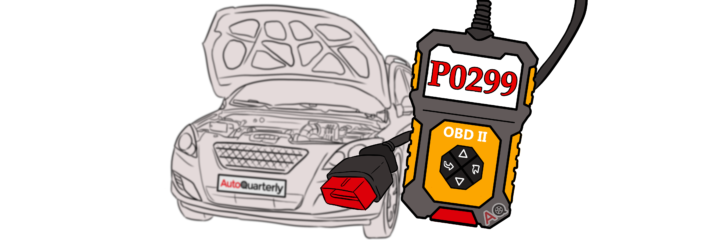If your car has generated the P0299 trouble code on an OBDII scanner, then you should proceed with caution. It may indicate mechanical faults in your vehicle that could lead to even more serious issues. In this article, we’ll explain how to identify and fix this issue.
What Does Code P0299 – Turbo/Supercharger Underboost Condition Mean?
Code P0299 – Turbo/Supercharger Underboost Condition means that there is an issue with your vehicle’s supercharger or turbocharger, which not all vehicles have. P0299 is a generic powertrain code so most models will have similar meanings. Check your model’s information as issues can still vary.
Super- and turbochargers, also known as forced induction systems, are designed to increase engine performance. Turbochargers take air from your engine’s exhaust and, using a turbine, funnels air into the intake. Superchargers are installed by the engine intake and typically use an engine belt that forces air into the intake.
Sometimes referred to as the “A” Underboost Condition, this fault code tells you that bank “A,” or your turbo/supercharger, is not producing enough pressure. Sensors compare the amount of the desired pressure to what is measured. If there is a discrepancy, your vehicle will produce a P0299 error code.
How Serious Is Code P0299?
Stop Driving
- If you experience a sudden decrease in engine performance, possibly accompanied by mechanical noise
- Your exhaust is releasing heavy, black smoke
You can safely drive with a P0299 for some time with little change in your vehicle’s performance. However, doing so can lead to more serious damage to your engine and forced induction system if not promptly resolved.
Related Sensors
- Boost Pressure Sensor (BPS)
- Injector Control Pressure Sensor (ICP)
Symptoms
- Mechanical noise from the engine or turbo/supercharger
- Heavy, black exhaust smoke
- Check engine light is on
- Reduced engine performance (vehicle is in “limp” mode)
Causes
There are many potential causes of P0299, which will make diagnosing the issue more difficult. Despite being a generic fault code, some manufacturers have additional guidance for this error code. Always make sure to consult any information specific to your vehicle’s make. Nonetheless, you may be in luck and the issue could be an easy fix, like below:
- Faulty BPS sensor
The following issues are more serious and can lead to further damage if left unresolved:
- Air leak or restriction at valves, intake, or hoses
- Faulty turbo/supercharger
Some vehicle makes will display P0299 for different reasons:
- Low oil pressure (Ford/Chevrolet)
- Faulty ICP sensor (Ford/Chevrolet)
- EGR system fault (Ford/Chevrolet)
- Low fuel pressure condition (Isuzu)
- Sticking turbocharger nozzle control solenoid (Isuzu)
- Fault wastegate bypass regulator valve (VW)
Solutions
Code P0299 can have a variety of causes, so making an accurate diagnosis can save you a lot of time and money. It’s very common for this code to be displayed because of air restrictions or leaks in the air intake system.
- Perform a visual inspection of the air intake system for cracks, disconnected parts, or blockages. Readjust or replace parts as necessary.
Error code P0299 can sometimes be the result of a problem with the oil pressure, rather than the forced induction system.
- Check your vehicle’s oil pressure. You’ll want to make sure it’s properly filled. See here for detailed steps on how to test oil pressure.
- Locate the injector control pressure sensor and remove it—refer to your vehicle’s service manual for help finding it. If you see any oil, you’ll likely need to replace the sensor itself.
Make sure to reset the codes and check if code P0299 is displayed again. If it persists, now you’ll want to take a look at the forced induction system.
- Manually test your vehicle’s boost pressure. You’ll need a boost pressure gauge, which can cost up to $50.
- If readings meet the requirements specified by the manufacturer, suspect an issue with the BPS. Clean and replace it as necessary.
- If the minimum requirements are not met, you’re dealing with a mechanical issue with the turbo/supercharger. Replacement can be very expensive depending on the model.
If the issue persists, refer to your manufacturer’s technical service bulletins and consider visiting a mechanic.
Code P0299 often means you need to stop driving your vehicle, especially in the presence of decreased performance. Fixing it could just be a matter of repositioning a loose hose or as costly as replacing your forced induction system. Make sure to be thorough and follow the steps outlined above to properly resolve any issues.


